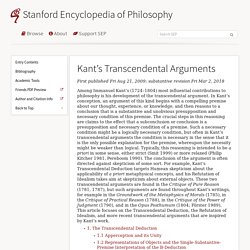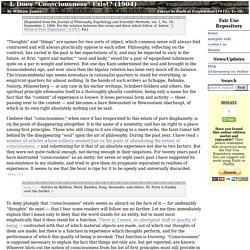

Previous finals 175. Kant's Transcendental Arguments (Stanford Encyclopedia of Philosophy) 1.

The Transcendental Deduction The Transcendental Deduction (A84–130, B116–169) is Kant’s attempt to demonstrate against empiricist psychological theory that certain a priori concepts correctly apply to objects featured in our experience. Dieter Henrich (1989) points out that Kant’s use of ‘Deduktion’ redeploys German legal vocabulary; in Holy Roman Empire Law, ‘Deduktion’ signifies an argument intended to yield a historical justification for the legitimacy of a property claim. In Kant’s derivative epistemological sense, a deduction is an argument that aims to justify the use of a concept, one that demonstrates that the concept correctly applies to objects.
For Kant a concept is a priori just in case its source is the understanding of the subject and not sensory experience (A80/B106; Strawson 1966: 86). Hume’s position on the deducibility of a priori metaphysical concepts is Kant’s quarry in the Transcendental Deduction. 1.1 Apperception and its Unity 2. Note 3. 3. And 4. Does Consciousness Exist? (1904). By William James in ESSAYS IN RADICAL EMPIRICISM (1904) // Fair Use Repository.
Thoughts and things are names for two sorts of object, which common sense will always find contrasted and will always practically oppose to each other.

Philosophy, reflecting on the contrast, has varied in the past in her expectations of it, and may be expected to vary in the future. At first, spirit and matter, soul and body, stood for a pair of equipollent substances quite on a par in weight and interest. But one day Kant undermined the soul and brought in the transcendental ego, and ever since then the bipolar relation has been very much off its balance. The transcendental ego seems nowadays in rationalist quarters to stand for everything, in empiricist quarters for almost nothing.
William James His Life and Philosophy. The principles of psychology.